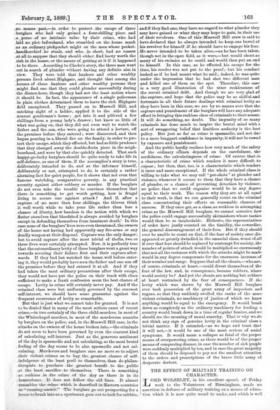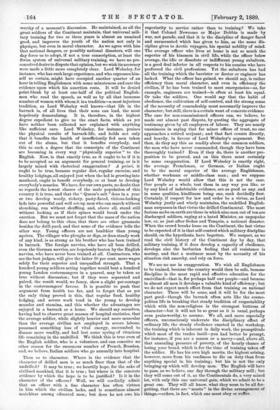THE EFFECT OF -MILITARY TRAINING ON CHARACTER.
-FORD WOLSELEY, in his excellent speech of Friday I I week to the Volunteers of Birmingham, made an assertion in defence of military training as a means of educa- tion which it is now quite usual to make, and which is well worthy of a moment's discussion. He maintained, as all the great soldiers of the Continent maintain, that universal mili- tary training for two or three years is almost an unmixed good, and improves the youth of the nation not only in physique, but even in moral character. As we agree with him that national dangers, or possibly national disasters, will one day force us to adopt, if not a true conscription, at least the Swiss system of universal military training, we have no pre- conceived desire to dispute that opinion, but we wish its accuracy were made a. little more completely clear. Lord Wolseley, for instance, who has such large experience, and who expresses him- self so certain, might have occupied another quarter of an hour in telling Englishmen with some minuteness and care the evidence upon which his assertion rests. It will be denied point-blank by at least one-half of the political English- men who read the speech, as well as by all that immense number of women with whom it is a tradition—a most injurious tradition, as Lord Wolseley well knows—that life in the barrack is, of all lives that their sons can lead, the most hopelessly demoralising It is, therefore, in the highest degree expedient to give us the exact facts, which as yet have neither been collected nor explained with anything like sufficient care. Lord Wolseley, for instance, praises the physical results of barrack-life, and holds not only that it benefits the health of insufficiently fed men taken out of the slums, but that it benefits everybody, and this to such a degree that the conscripts of the Continent are becoming in every way "physically superior" to the English. Now, is that exactly true, as it ought to be if it is to be accepted as an argument for general training, or is it largely mixed with rhetorical exaggeration ? A priori, it ought to be true, because regular diet, regular exercise, and healthy lodgings, all enjoyed just when the lad is growing into manhood, ought to benefit everybody, or at least to develop everybody's muscles. We have, for our own parts, no doubt that as regards the lowest classes of the male population of this country it is true, and that the "Queen's salt "does in a year or two develop weedy, rickety, pasty-faced, vicious-looking lads into powerful and well set-up men who can march without slouching, run without shuffling, and, above all, stand still without looking as if their spines would break under the exertion. But we must not forget that the mass of the nation does not belong to this class, that there are other gymnasia besides the drill-yard, and that some of the evidence tells the other way. Young officers are not healthier than young squires. The villager who ploughs or digs, or does steady work of any kind, is as strong as his brother who has been trained in barrack. The foreign navvies, who have all been drilled, even the German navvies, are hopelessly beaten by the English nay-vies, who have never been trained at all. Contractors, who are the best judges, will give the latter 50 per cent. more wages solely for their superior and unequalled strength. That a hundred young soldiers acting together would beat a hundred young London costermongers in a quarrel, may be taken as true without discussion; but if they were separated and paired, the result would, we fancy, show a slight per-centage in the costermongers' favour. It is possible to push that argument from health too far, and to forget that as yet the only thing proved is this, that regular food, healthy lodging, and severe work tend in the young to develop muscles and stamina, and this whether the advantages are enjoyed in a barrack or a home. We should say ourselves, having had to observe great masses of hospital statistics, that the average soldier, while slightly heavier and more muscular than the average civilian not employed in severe labour, possessed something less of vital energy, succumbed to disease more readily, and had lost some spring of vivacious life remaining in the undrilled. We think this is true even of the English soldier, who is a volunteer, and can conceive no other reason for the enormous number of French, Russian, and, we believe, Italian soldiers who go annually into hospital.
Then as to character. Where is the evidence that the character of drilled men is so much finer than that of the undrilled ? It may be true ; we heartily hope, for the sake of civilised mankind, that it is true ; but where is the concrete evidence by which the hope is to be justified ? Is it in the character of the officers P Well, we will cordially admit that an officer with a fine character has often virtues in him which the civilian lacks, and is sometimes almost matchless among educated men; but does he not owe his
superiority to service rather than to training ? We take it that Colonel Newcome or Major Dobbin is made by war, not parade, and that it is the discipline of danger faced and surmounted which has given to him, as the same dis- cipline gives to Arctic voyagers, his special nobility of mind. The average officer who lives at home is not so much the superior of his kinsmen in civil life, while the officer below average, the idle or dissolute or indifferent young subaltern, is a good deal inferior in all respects to his cousins who have preferred the civil professions. Yet the subaltern has had all the training which the barrister or doctor or engineer has lacked. What the officer has gained, we should say, is rather efficiency than moral character, and even in efficiency the civilian, if he has been trained to meet emergencies—as, for• example, engineers are trained—is often at least his equal. Or take the soldiers. One would say that the habit of obedience, the cultivation of sell-control, and the strong sense of the necessity of comradeship must necessarily improve the character; but still, there is a certain want of concrete evidence The case for non-commissioned officers can, we believe, be made out almost past dispute, by quoting the aggregate of testimony given by all employers of labour. They are nearly -unanimous in saying that for minor offices of trust, no one approaches a retired serjeant ; and that fact counts directly, and heavily, in favour of Lord Wolseley's argument. But then, do they say this as readily about the common soldiers, the men who have never commanded, though they have been thoroughly trained P Even if they do, there is another pro- position to be proved, and on this there must certainly be some exaggeration. If Lord Wolseley is exactly right, the average Frenchman, or German, or Italian ought to be the moral superior of the average Englishman, whether workman or middle-class man ; and we suppose Lord Wolseley would allow that this is not the case. Our people as a whole, test them in any way you like, or by any kind of indubitable evidence, are as good as any, and in some qualities, kindliness being one, rank decidedly first. Certainly, if respect- for law and order be a virtue, as Lord Wolseley justly and wisely maintains, the undrilled English- man surpasses in that virtue the drilled Continental. The most furious mobs on earth are those in which nine men out of ten are discharged soldiers, raging at a hated Minister, an unpopular Jaw, or, as just after Sedan and Tonquin, a national disaster. When the crowd breaks loose on the Continent, the last virtue to be expected of it is that self-control which military discipline should, on the hypothesis, have begotten. We suspect., as we read the civil history of the Continent day by day, that military training, if it does develop a capacity of obedience, develops also the barbarian feeling that all resistance is mutiny, and that a mutineer must by the necessity of his situation risk anarchy, and rely on force.
We see no use in exaggeration. We wish all Englishmen to be trained, because the country would then be safe, because discipline is the most rapid and effective education for the uncivilised—that is, for perhaps half our people—and because in almost all men it develops a valuable kind of efficiency ; but we do not expect much effect from that training on national character. There will be some, and it will be for the most part good—though the barrack often acts like the cosmo- politan life in brealring that steady tradition of respectability which with the non-religious is the strongest buttress of character—but it will not be so great as it is usual, perhaps even praiseworthy, to assume. We all, and more especially officers, unconsciously underrate the disciplinary effect of ordinary life, the steady obedience exacted in the workshop, the training which is inherent in daily work, the promptitude which most of the trades instil—you had better be prompt, for instance, if you are a mason or a navvy—and, above all, that annealing pressure of poverty, of the hourly chance of losing your bread, which is for the time of training taken off the soldier. He has his own high merits, the highest arising, however, more from his readiness to die on duty than from anything special in his training ; but his is not the only bringing-up which will develop men. The English will have to pass, as we believe, one day through the military mill ; but they will come out of it, as the Continentals do, a very mixed lot, with only this one universal gain, which we admit to be a great one. They will all know, what they seem to be all for- getting, that there are " musts " in the divine arrangement of things,—orders, in fact, which one must obey or suffer.



































 Previous page
Previous page